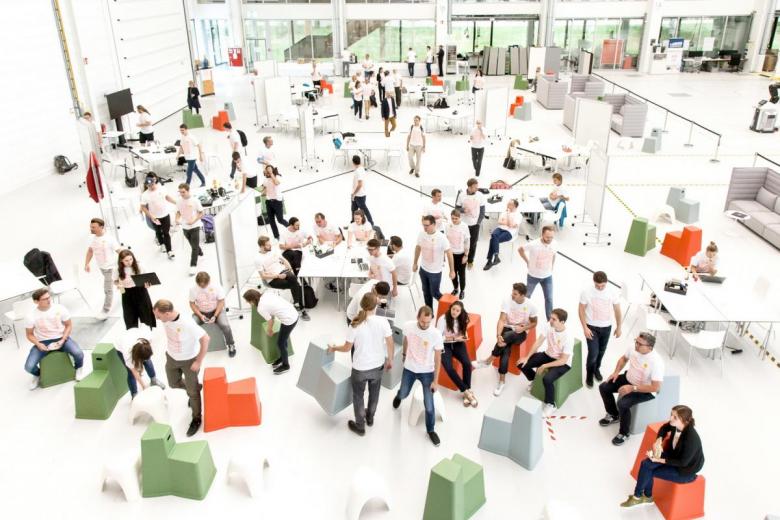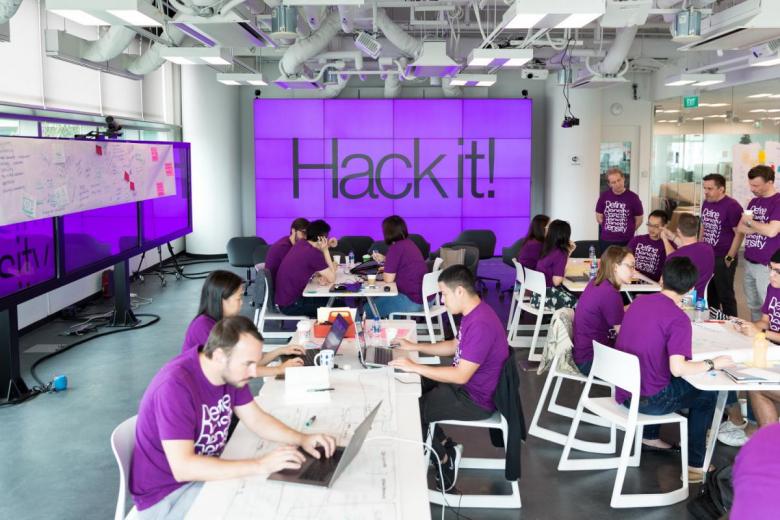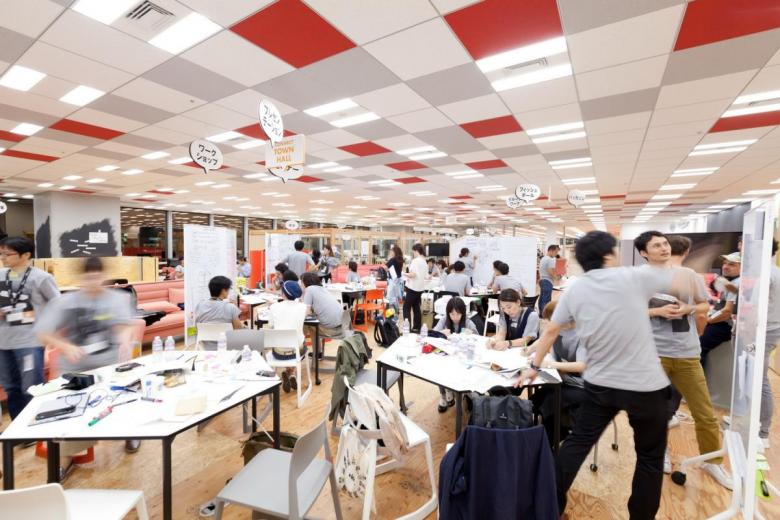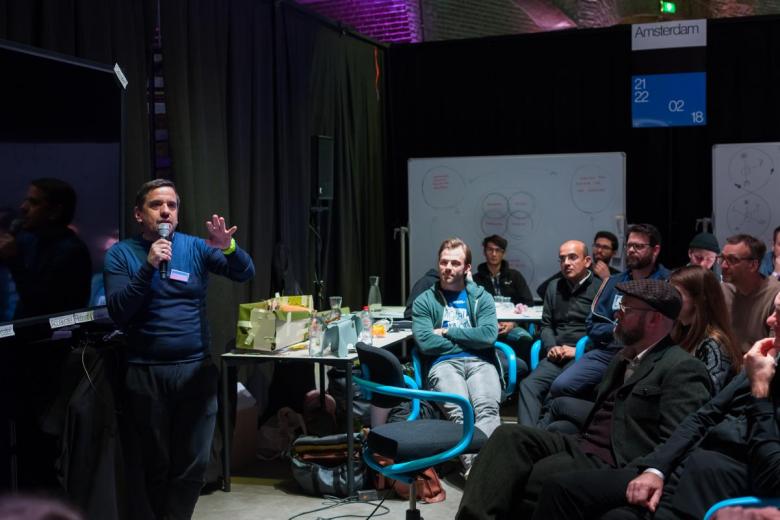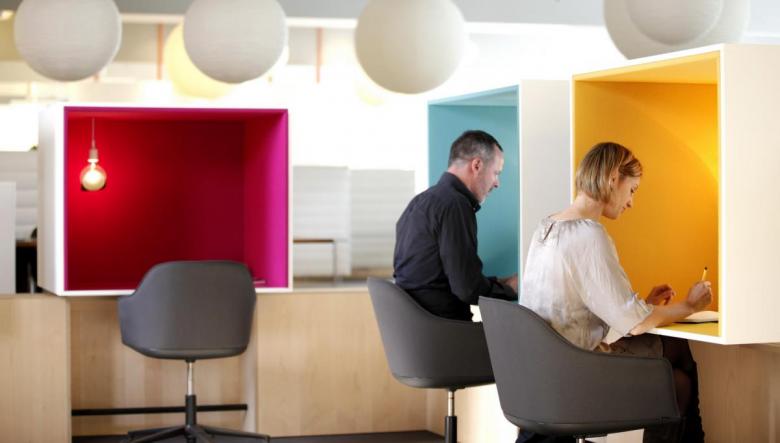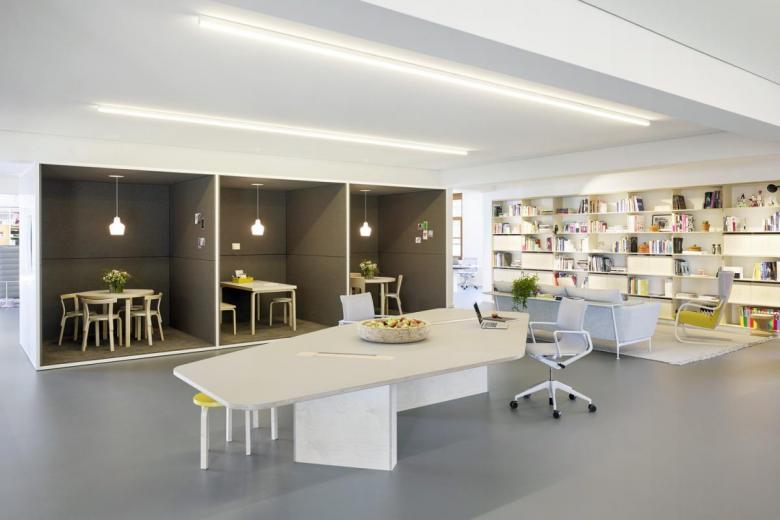Interview with Raphael Gielgen, Vitra GmbH
Future Office: Flexibility I
The ever-present digitalisation is particularly noticeable in the office, where many technologies come together and open up undreamt-of possibilities for work. But how do we want to work in the future? What future models are available? How flexible must workplaces and thus employees already be today and in the future? We asked a planner and a futurologist to tell us about their views. In this issue: Raphael Gielgen from Vitra.
Interview partner: Raphael Gielgen, Vitra (Weil am Rhein, DE)
Click here to read the interview with Giulio Castegini from Drees & Sommer about the "Future Office": Future Office: Flexibility II
Thomas Geuder: Mr. Gielgen, Vitra is known as a manufacturer of high-quality living and office furniture, whose factories produce many design classics. Many of the collections are the result of good collaboration with designers. Nevertheless, or perhaps precisely because of that, the company affords itself a kind of research team that you are heading. How would you describe your research assignment?
Raphael Gielgen: This "team" actually consists only of myself. In fact, I wouldn't even call my work "research". For Vitra, working together with creative people has always been more of an input that, unlike research, is not evidence-oriented. With my position, the company is affording someone who acts as a kind of troublemaker, who always has some newly discovered or seen to bring into play. I question existing structures; of course, this can be annoying at times. At the same time, I give fresh impetus to the organization and arouse curiosity among the employees. In principle, my "research assignment" is based on four levels: 1. searching without a specific research request, 2. understanding and realising what I have found, 3. co-creating with the collective intelligence of external creative people and 4. networking people with each other, creating a network that exceeds my person. Free, direct, very open, and transparent.
Thomas Geuder: How can I imagine your everyday work as a troublemaker at Vitra and the collaboration with your colleagues?
Raphael Gielgen: I see my role as a supplier and service provider. When people have questions in this context, they contact me. The aim of my work must be to multiply myself and my produced contents to the greatest possible extent. The lectures I gave three years ago are now being given by my colleagues in the markets. I don't restrict myself by presenting everything in a particularly complicated or highly sophisticated way, but by making everything as simple as possible. Strictly speaking, I only provide the company with information from which my colleagues can then derive changed contexts. In other words: I provide the weather, the employees are the pilots of the aircraft. How the individual employees and departments then accept and implement this is their sole responsibility. I'm not an executive. I don't force my colleagues into structures, the same is true the other way around. To be able as an organisation to afford and actually want someone like me is a very privileged situation.
Thomas Geuder: Rigid structures such as the cellular office or the open-plan office have long been obsolete. Instead, there has recently been talk of the almost limitless flexibilisation of work and the office environment. What do you as a trend scout say about these latest developments?
Raphael Gielgen: First of all, you have to look at it from the outside. People have two great desires: freedom and belonging. Freedom is finally reality, thanks to all the technical possibilities of working. Nevertheless, humans have a desire for belonging. The office as a place of belonging in the sense of locating people will certainly accompany us for at least another ten years. The more we are on Instagram, Facebook, etc., the more we want to be located. And places of work can be these anchor points. The desire for freedom and belonging must, of course, also function on the office scale. In other words, the office must be a place where I can simply disappear and be on my own, and, at the same time, a place where things are bustling like at Cologne Central Station. So, strictly speaking, there is no ultimate answer to the question of the right office. Flexibility is sensational for freedom, but subconsciously, belonging is also a central aspect. Companies will collapse if they no longer manage to maintain a sense of belonging because this is the cultural force field. However, the beauty of architecture itself is that belonging and community can be designed and built.
Thomas Geuder: Smart building, smart grid, smart office: All forms of communication come together in the office. What importance do you attach to digital networking in the office of the future — or is it human skills that really matter?
Raphael Gielgen: This is a sensational question! The historian and writer Yuval Noah Harari — who wrote the book "Homo Deus" — was invited to the TED in Vancouver in 2018, but did not want to travel there. Therefore, the TED organizers holographically brought him onto the stage, as a projection onto a glass pane. His first sentence in the lecture was: "I did write that humans will become digital, but I didn't think, it will happen so fast and it will happen to me." So, whoever writes about the digitalisation of human beings will be surprised by it! We once initiated a crowdstorm that asked how people imagine the world of work to be in 2025. Over 60 percent of the ideas submitted had nothing to do with the physical place of work. Therefore, I am firmly convinced that the virtual working level will offer unprecedented possibilities for us. Of course, I'm a person who can simply imagine everything. That's why I also believe that the fictitious world will reach the next level, in the sense of an expansion of consciousness. I also firmly believe that work at the interface between physical and virtual offers enormous potential as a "digital twin". At the same time, however, I am also convinced that the physical power of places and objects is still enduring.
Thomas Geuder: Nevertheless, personal contact from person to person will continue to be important for people in the future, won't it?
Raphael Gielgen: There is a wonderful quote from journalist Jon Murphy, who wrote a report in the Metropolis magazine about why Airbnb managed to be so successful: Because the traditional hotels have at some point only built generic, general-purpose hotels and have stopped to locate people. The hotels have completely destroyed the "travel experience" in their marketing-focused approach. "Keeping up with digital times, the industry has failed to realize that the more connected we are virtually the more we crave for real human connection." Thus, both worlds can enrich each other.
Thomas Geuder: You are currently travelling the world with the workshop series "Work Hackathon". What is it all about and what conclusions can be drawn for the office of the future?
Raphael Gielgen: The idea of the "Work Hackathon" is to have questions answered by a community. Basically, this always works according to the same principle: we undertake the mental and emotional transfer into another time, then we work conceptually on issues from the perspective of this time and finally build prototypes. The format is open and interdisciplinary, the teams have to apply. What conclusions can be drawn for the office of the future? The participants first make the important experience of what it means to work on a topic without any restrictions. And they learn how important it is to know the methods and tools that collaborative work requires. Many participants are surprised at how quickly you can create prototypes that you hadn't even imagined the day before. On the Monday following such a Hackathon, many of them don't simply continue with the usual agenda, because they want to do things differently now and because it is important for them to question the status quo and the comfort zones.
Thomas Geuder: Taking a look at recent decades, the office has greatly changed and developed, away from rigid systems towards mobile ones. Where do you see the office in 20 or 30 years?
Raphael Gielgen: To answer this question, I would like to address a very fundamental aspect: In our culture, the office is conceived in standard floor sizes — which are like bonsai vessels for growing employees. They're too small per se. Spatially, the places of work we conceive are too small. That's the strongest poison. A place of work is not a warehouse! This is a concept that has evolved with the end of industrialisation, when the office had to subordinate itself to functionalism. Today, this concept is simply wrong. And the office in 20 years: I think there will be several office types. People will probably organise themselves like working communities. For the employees, the first attractor is the community with those who work on similar issues and tasks, as well as the benefit arising from being located in this community. This place will basically be everything: laboratory, garden, etc. Like a wonderful urban quarter that has evolved over decades. However, this biotope will probably only be available to 20% of working people, as generic work will be replaced by computers and robots. As a result, the architecture of work will certainly change. The challenges lying ahead of us in a changed world of work are enormous — but they can be solved.
Thomas Geuder: Thank you very much for the interesting interview, Mr. Gielgen.
Raphael Gielgen
has spent most of his professional life improving the office environment. His curiosity about architecture, technology, and social change in the context of working environments is his motivation — always related to the question of how the global working environment is changing and what effects it has on existing business models. Constantly travelling to discover what tomorrow's workplace will be like, he meets regularly with managing directors, architects, and designers — people who can make this knowledge accessible to society. His work contributes to Vitra's ambition to improve the quality of offices and public spaces through the power of design, by providing the diverse Vitra team with the results of his observations and insights through trend clusters, market analysis, and profitability calculations.
Paperworld and the Future Office
The Paperworld trade fair is the world's most important information and communication platform for modern office design. Every year, the trade fair in Frankfurt / Main presents the latest products and trends in the national and international paper, office supplies and stationery industry. The special show "Future Office" addresses architects, facility managers, planners, and retailers of office supplies and equipment. After celebrating its successful premiere in 2017, the third edition of the show now focuses on the subject of "flexibility". It presents the diverse opportunities that the current change in the world of work entails in a stimulating and inspiring setting. The design concept of the special show has once again been the responsibility of the architectural office Matter and its principal, the internationally renowned architect André Schmidt from Berlin, together with World-Architects. The special area "Future Office" is located in Hall 3.0 Stand C51 and will provide lectures and new ideas on tomorrow's working world all-day during Paperworld from 26 to 29 January 2019.
Registration for the lectures on January 28 and 29 in Frankfurt / Main with Giulio Castegini (Drees & Sommer), Martin Henn (HENN), Anika Hülser (HPP Architekten), Oliver Kupfner (INNOCAD), Kilian Kada (kadawittfeldarchitektur), Sabine Krumrey (brandherm + krumrey interior architecture), Mark Jenewein (love architecture), and Samir Ayoub (designfunktion):
Paperworld 2019 — Future Office — Registration
World-Architects is a content partner of Messe Frankfurt.
